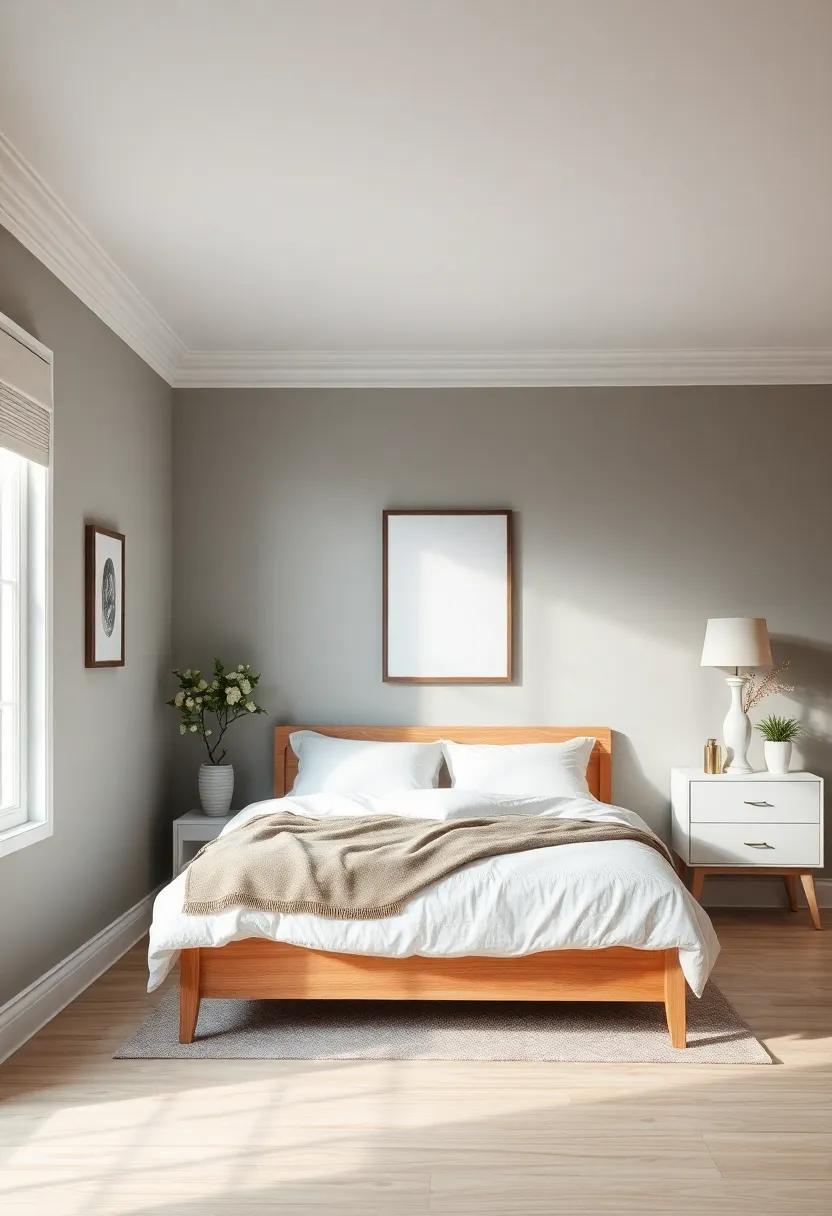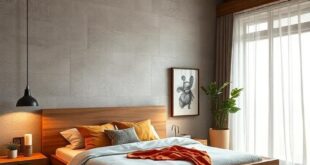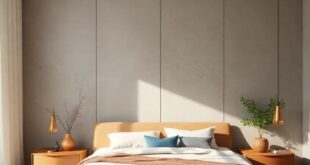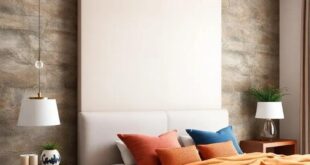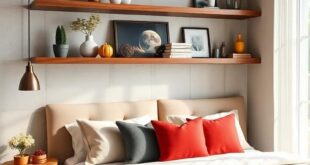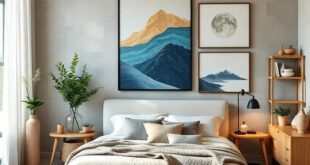In the world of interior design, every square inch counts, and when it comes to small bedrooms, the right choice of color can make all the difference. A carefully selected paint palette has the power to transform a modest space into a stylish sanctuary, where functionality harmonizes effortlessly with aesthetic appeal. Whether you’re seeking to create the illusion of height with light hues, infuse warmth with bold accents, or establish a serene retreat with calming tones, the way you wield your paintbrush can redefine your bedroom experience. In this article, we’ll explore a variety of creative paint ideas that not only maximize space but also enhance your personal style, ensuring your small bedroom feels both spacious and inviting. Get ready to discover how color can unlock the full potential of your sleeping quarters, turning them into a chic haven that reflects your unique taste while embracing every bit of available space.
Creative Color Palettes That Open Up Small spaces
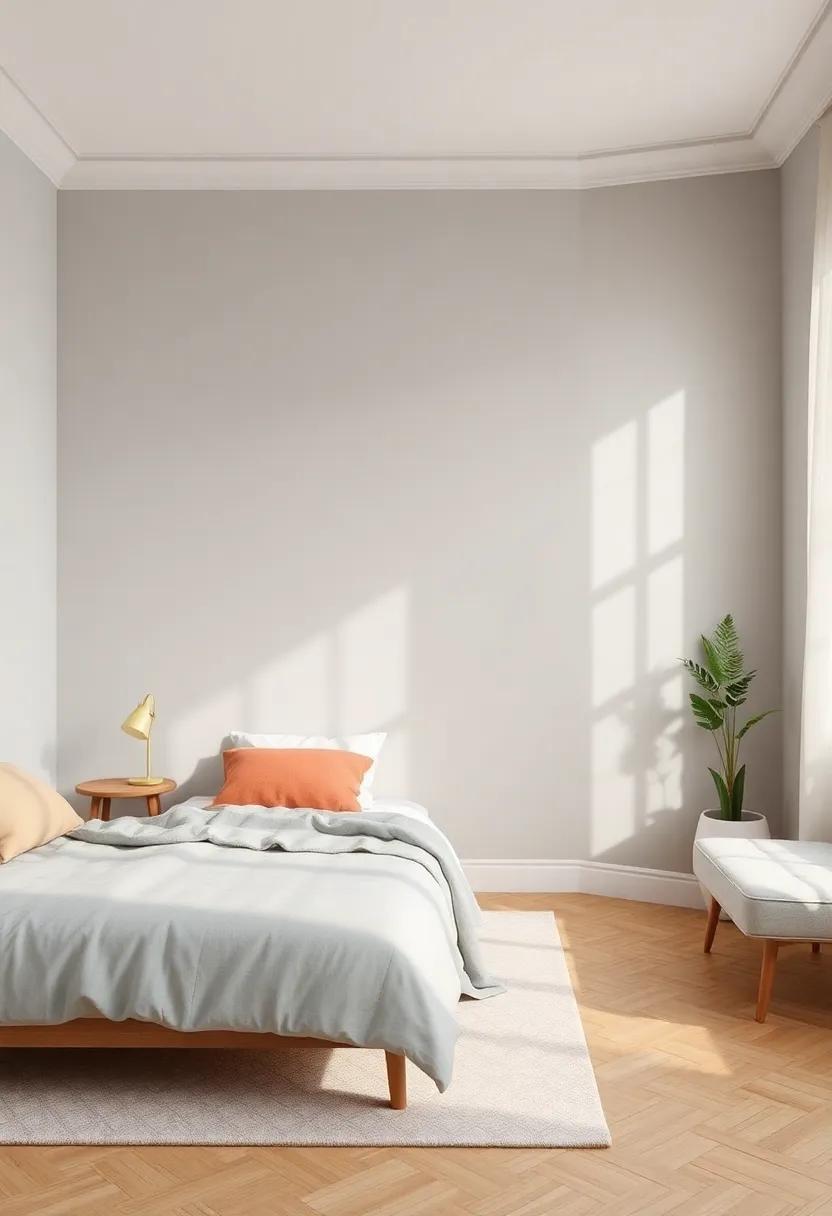
When it comes to maximizing the perception of space in a small bedroom, the right color palette can work wonders. Soft pastels evoke a sense of calm and tranquility, making them perfect for compact areas.Consider using hues like pale pink, mint green, or sky blue. pair these shades with <a href="https://decorifusta.com/embracing-serenity-the-art-of-white-bedroom-designs/” title=”Embracing Serenity: The … of White Bed… …s”>white or light gray accents for a fresh, airy feel. The contrast between the pastel walls and a vibrant accent piece, such as a bold lamp or throw pillows, can create a striking focal point without overwhelming the space.
another effective approach is to opt for monochromatic palettes featuring different shades of one color. This can add depth without cluttering the visual landscape. For example, using various tones of deep blue or earthy taupe can create a harmonious atmosphere that appears more spacious than it is. Incorporating textures thru fabrics or wall treatments can further enhance the elegance of a monochromatic scheme.You can also apply different finishes, such as matte and satin, to maintain visual interest while keeping the overall look cohesive.
Soft Neutrals for a Calming Bedroom Retreat
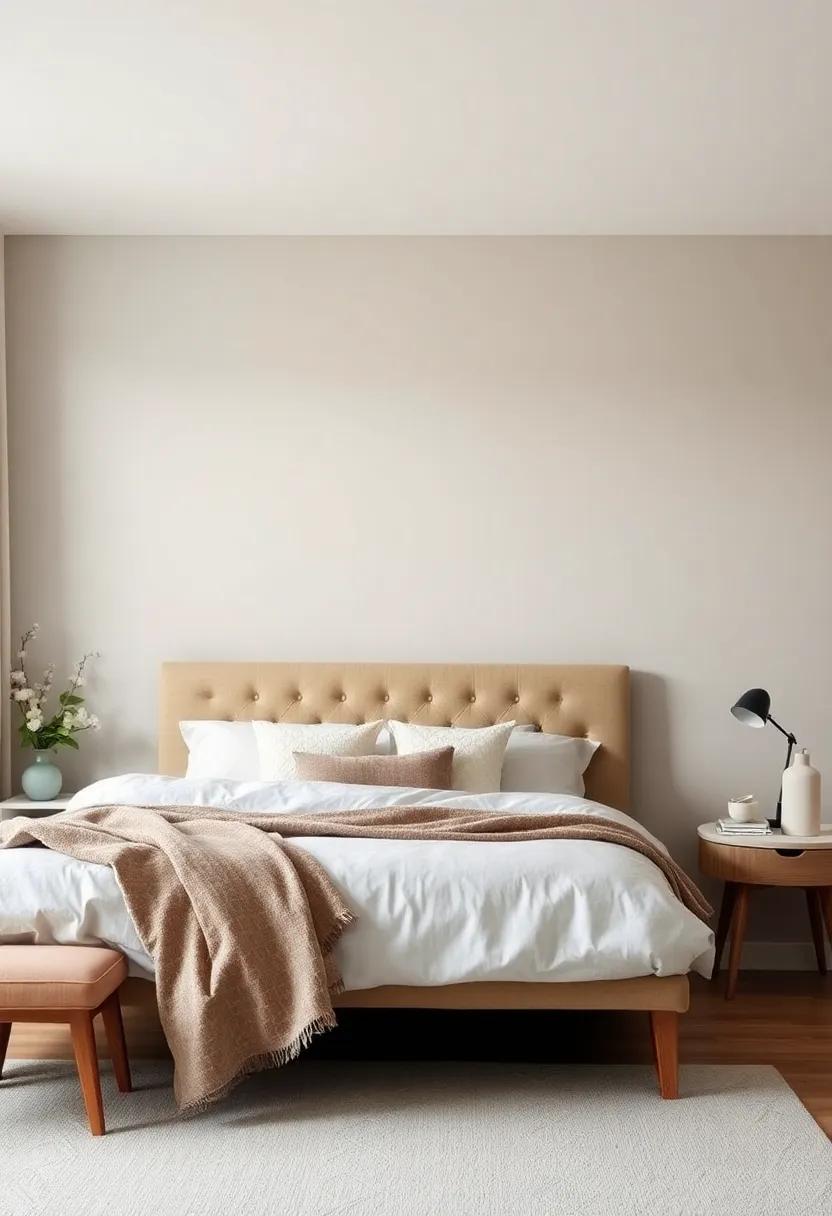
creating a bedroom sanctuary ofen begins with choosing the right color palette, and soft neutrals offer the perfect solution for achieving a serene atmosphere. Shades like warm beige, gentle taupe, and dusty greys can create a seamless backdrop that enhances natural light and makes a small space feel more expansive.To introduce depth, consider using various textures and finishes; for instance, pairing a matte wall with a satin finish on furniture creates an inviting contrast without overwhelming the senses.
Incorporating these tones into your décor can be both elegant and versatile. Experiment with subtle accents, such as light wood tones or soft fabrics, to maintain that calming effect. A well-curated selection of accessories can amplify your neutral scheme, including:
- Plush throws in creamy whites or soft pastels
- Artwork featuring pastel hues or abstract lines
- Layered rugs using natural fibers
Such thoughtful elements work in harmony to create a tranquil retreat that invites relaxation and rejuvenation at the end of a busy day.
Bold Accent Walls Transforming Your Bedroom Aesthetic
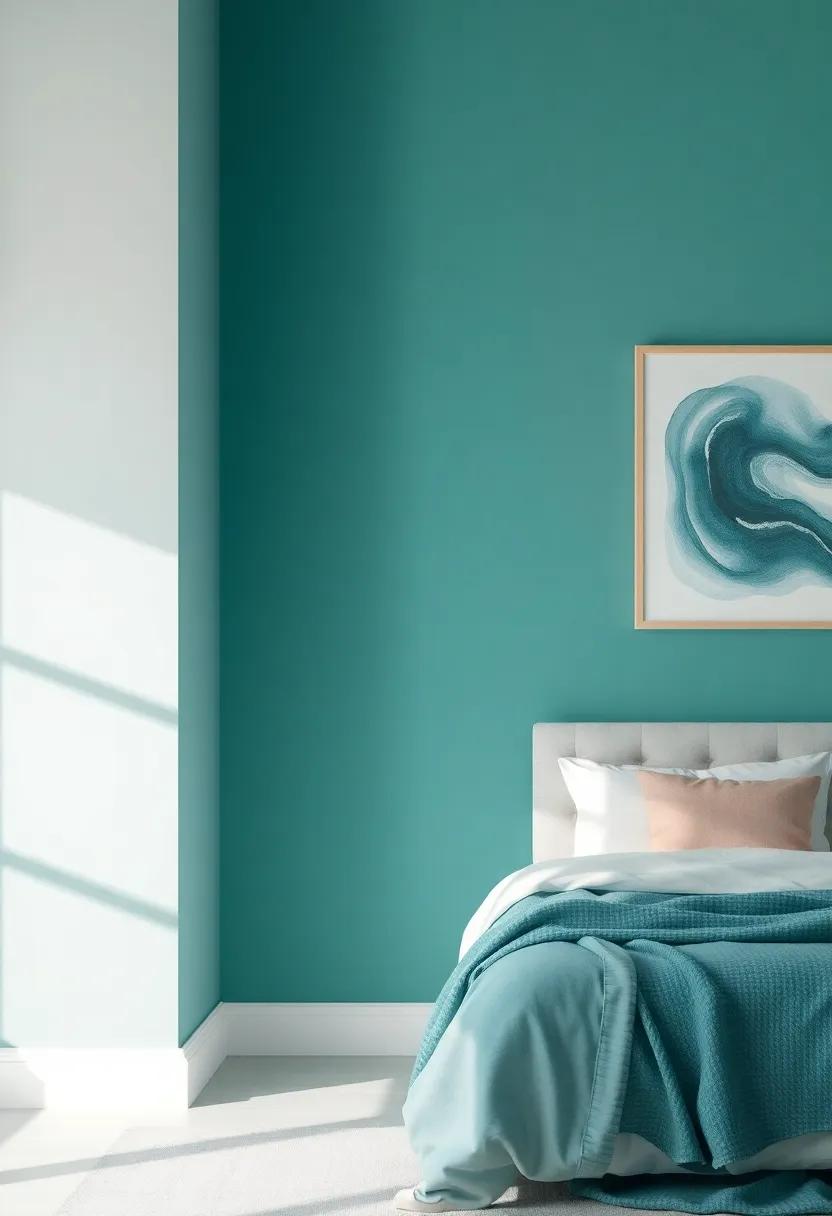
Incorporating a bold accent wall into your bedroom can make a striking impact on your overall design, drawing the eye and adding depth to the space. When choosing your accent color, consider options like deep teal or rich burgundy, which can create a cozy yet elegant atmosphere. Pair your accent wall with lighter, neutral shades for the remaining walls to enhance the feeling of openness. Here are a few ideas to inspire your selection:
- Geometric Patterns: Use painter’s tape to create sharp lines or shapes that add visual interest.
- Wallpaper Alternatives: Consider using removable wallpaper for an easy and trendy update.
- Textured Finishes: Opt for techniques like sponge painting or stucco to add depth without overwhelming the space.
To complement the bold choice of an accent wall, the right decor can further elevate your bedroom’s aesthetic. Using furniture and accessories that match or contrast with the accent color can create a harmonious and cohesive look. Here are a few simple ideas to enhance your design:
| element | Suggestion |
|---|---|
| Bed Linens | Select bedding that incorporates the accent color or complements it. |
| Artwork | Choose pieces that resonate with your accent wall’s hue for a cohesive theme. |
| Lighting Fixtures | Incorporate lamps or ceiling lights in colors that enhance your wall’s statement. |
Vertical Stripes to Elevate Your Ceiling Perception
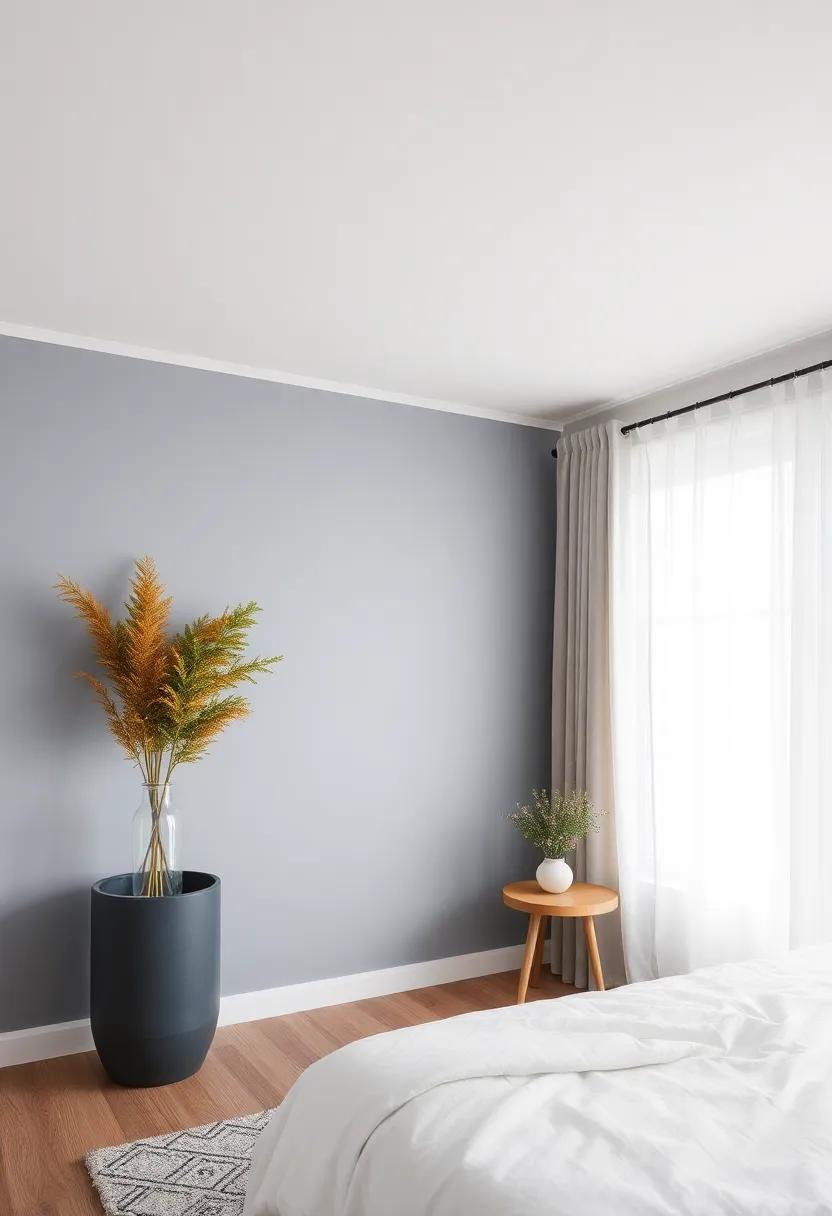
One of the most effective ways to create the illusion of height in a small bedroom is by utilizing vertical stripes on your walls. This design trick draws the eye upward,making the ceiling appear higher than it really is. whether you opt for paint or wallpaper, the secret lies in the width and contrast of the stripes. Consider these options to achieve the desired effect:
- thin Stripes: Create a subtle,airy feel that enhances serenity.
- Bold colors: Use high-contrast stripes to inject personality while still elongating the walls.
- Gradient Effects: Incorporate shades that transition vertically to add depth and visual appeal.
To further enhance the impact of vertical stripes, pairing them with coordinated decor can create a cohesive look. incorporating light fixtures and furniture that sit high off the ground or mirror surfaces can reflect light and create a sense of spaciousness. Here’s a simple table showcasing color combinations that work well with vertical stripes for a harmonious design:
| base Color | Stripe Color | Effect |
|---|---|---|
| Soft white | Deep Navy | Elegant Contrast |
| Pale Gray | Radiant Yellow | Cheerful Energy |
| Muted Beige | Forest Green | Natural Harmony |
Illusionary designs: Using Patterns to Expand the Room
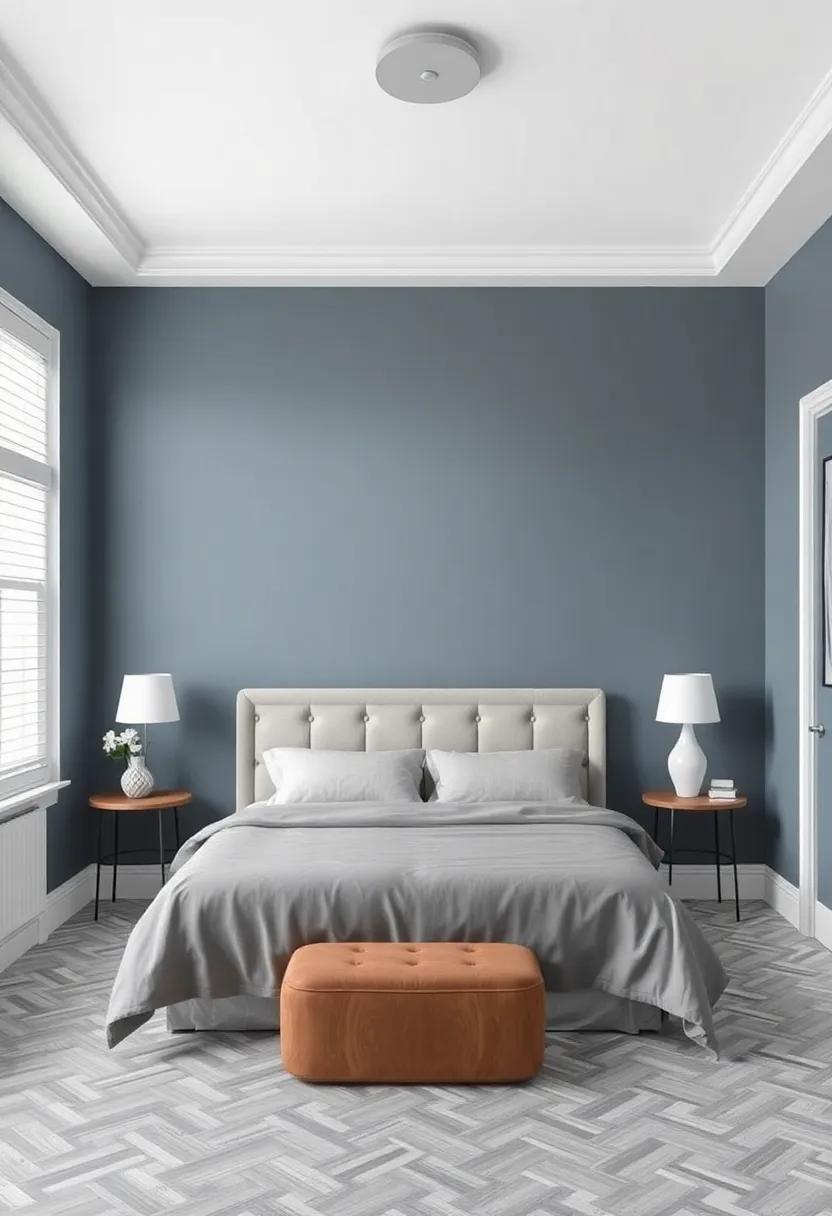
Patterns can be a transformative tool in small bedroom designs, creating an illusion of space while also adding personality and flair. By incorporating bold or whimsical patterns, walls can seemingly extend, drawing the eye upward or outward. Consider the following options for enhancing your bedroom’s dimensions:
- Vertical stripes: These can make ceilings appear taller and add a dynamic element to your walls.
- Geometric shapes: A carefully arranged geometric pattern can lead the eye across the room, giving a sense of openness.
- Soft florals: Delicate floral designs can introduce a lightness while still providing warmth to the space.
To maximize the visual space, paint the ceiling the same color as the walls or use light colors to reflect more light.Experiment with incorporating patterns on only one accent wall to maintain a balance; this technique can prevent overwhelming the space while still allowing personality to shine through. Here’s a speedy reference table for popular pattern styles and their effects:
| Pattern Style | Visual Effect |
|---|---|
| Stripes | Heightened vertical space |
| Polka Dots | Cheerful and playful ambiance |
| Chevron | Dynamism and movement |
| Floral | Warmth and softness |
Light-Reflective Paints That Brighten small spaces
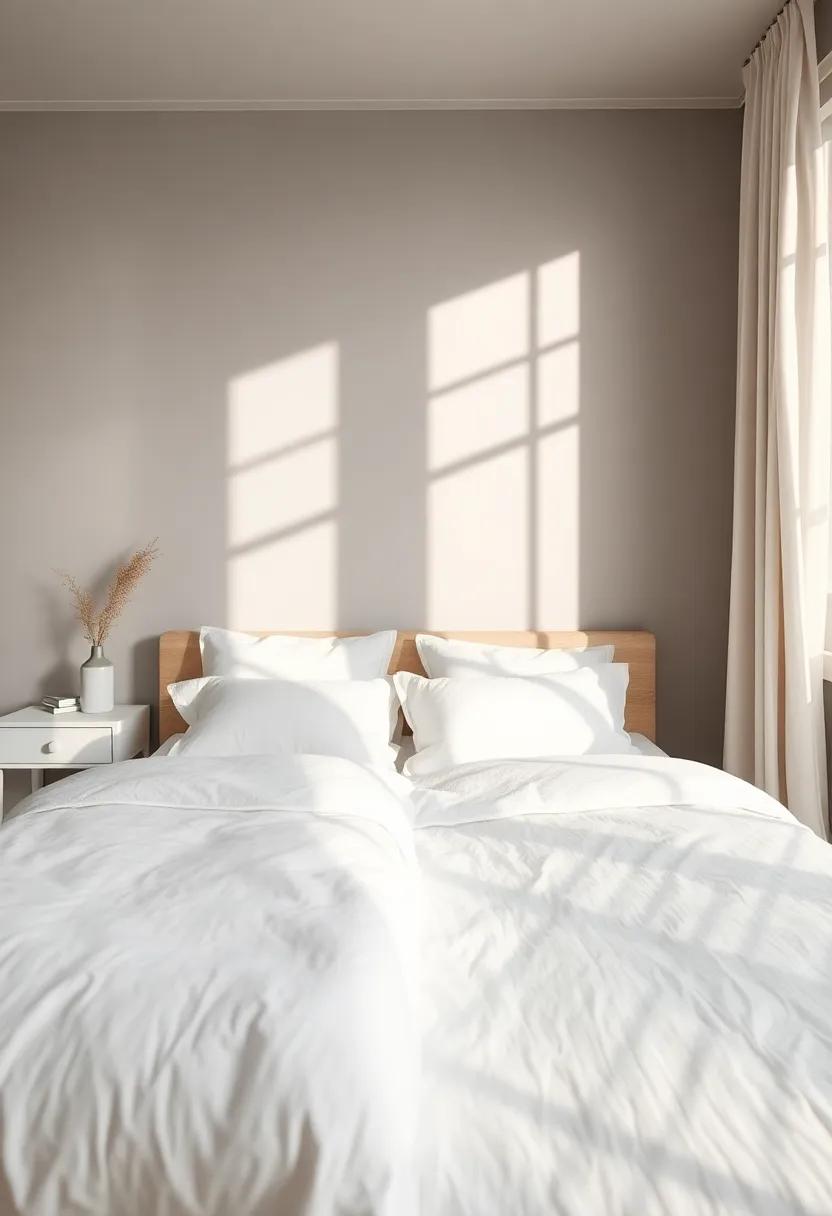
In the quest to make the most of a compact bedroom, light-reflective paints stand out as an ingenious solution. These specialized formulas are designed to bounce light around the room, enhancing both brightness and perceived space.Choosing a soft white, pale pastels, or gentle creams can work wonders. Each hue enhances natural light by creating an airy atmosphere, making your small room feel infinitely larger. Complement your choice with gleaming accents and reflective surfaces like mirrors or metallic decor to amplify the effect further.
To maximize the impact of light-reflective paints, consider the following tips:
- Choose the right Finish: Opt for satin or eggshell finishes, as they reflect more light than flat paints.
- Limit Dark Colors: If using darker shades, apply them only as accents rather than on all walls.
- Utilize Trim and molding: Paint trim and moldings in a contrasting light tone to add depth and dimension.
For a quick reference on popular light-reflective paint colors, see the table below:
| Color | Effect | Best Used In |
|---|---|---|
| Soft White | Brightens and uplifts | Any small space |
| Pale Blue | Cools and expands | Bedrooms with warm light |
| Light Mint | Freshens and calms | Master or guest room |
Pastel Shades for a Modern and Airy Look
Incorporating pastel shades into your small bedroom can instantly create a sense of spaciousness and tranquility. These soft hues, ranging from light pinks to gentle blues, evoke a calming atmosphere while enhancing light reflection, making the room feel both modern and airy. Consider using pastel colors on your walls, allowing them to serve as a delightful backdrop that brightens the space without overwhelming it. you could even paint an accent wall in a slightly bolder pastel to create focal points that draw the eye upward, which can help expand the visual space.
To achieve a cohesive and stylish look,pair your pastel walls with complementary decor elements. Here are some ideas to harmonize with the soothing palette:
- Furniture: Choose light wood or white furniture that blends well with pastel tones.
- Textiles: Incorporate soft linens in matching shades for bed coverings, cushions, and curtains.
- Artwork: Select pieces that feature pastel accents or simple, airy designs.
For a touch of elegance,consider adding a simple table to showcase decorative items that echo your color scheme. A small, round accent table in a muted tone can serve as both a functional piece and a stylish element in the room.
| Pastel Color | Style effect |
|---|---|
| Soft pink | Warm and inviting |
| Powder Blue | Cool and calming |
| Mint Green | Fresh and airy |
| Lavender | Elegant and soothing |
Using Dark Colors Strategically for Impactful Contrast
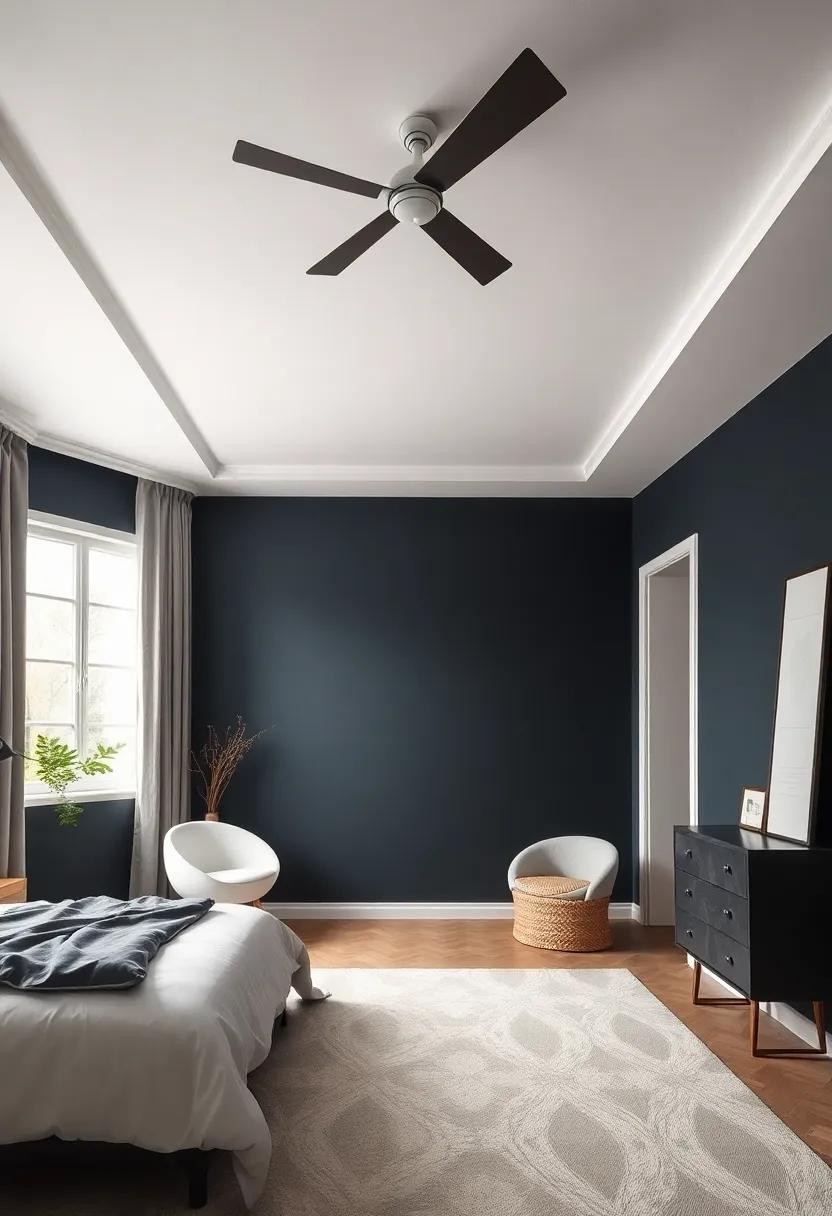
Embracing darker hues in your small bedroom can dramatically enhance the overall aesthetic while emphasizing spatial characteristics. when used strategically, these shades can create a rich, inviting atmosphere that pulls the eye in and provides a striking contrast to lighter elements in the room. As a notable example, consider painting the walls in a deep navy, charcoal, or forest green, while using white or light neutral furnishings to counterbalance the depth. This juxtaposition not only makes the space feel cozy and intimate but also helps to give the illusion of height and openness.
Additionally, incorporating darker colors in defined areas can strategically highlight features you want to showcase, such as a headboard, artwork, or architectural details. You can achieve this by employing techniques like color blocking or creating an accent wall that draws attention. Utilizing items such as dark curtains or a richly colored area rug can anchor the design and add layers to the visual experience. Here are a few tips to maximize the use of dark colors:
- Select one main dark hue for the primary features of the room, ensuring it complements the overall decor.
- Pair dark colors with various textures to maintain visual interest and depth.
- Incorporate clever lighting to enhance the richness of darker shades, making your room feel more spacious.
| Color | effect |
|---|---|
| Charcoal | Provides a sophisticated, modern edge while creating depth. |
| Navy | Offers a calming yet elegant atmosphere, enhancing relaxation. |
| Forest Green | Brings a natural vibe, promoting a refreshing and tranquil habitat. |
Murals as Focal Points in Cozy Bedrooms
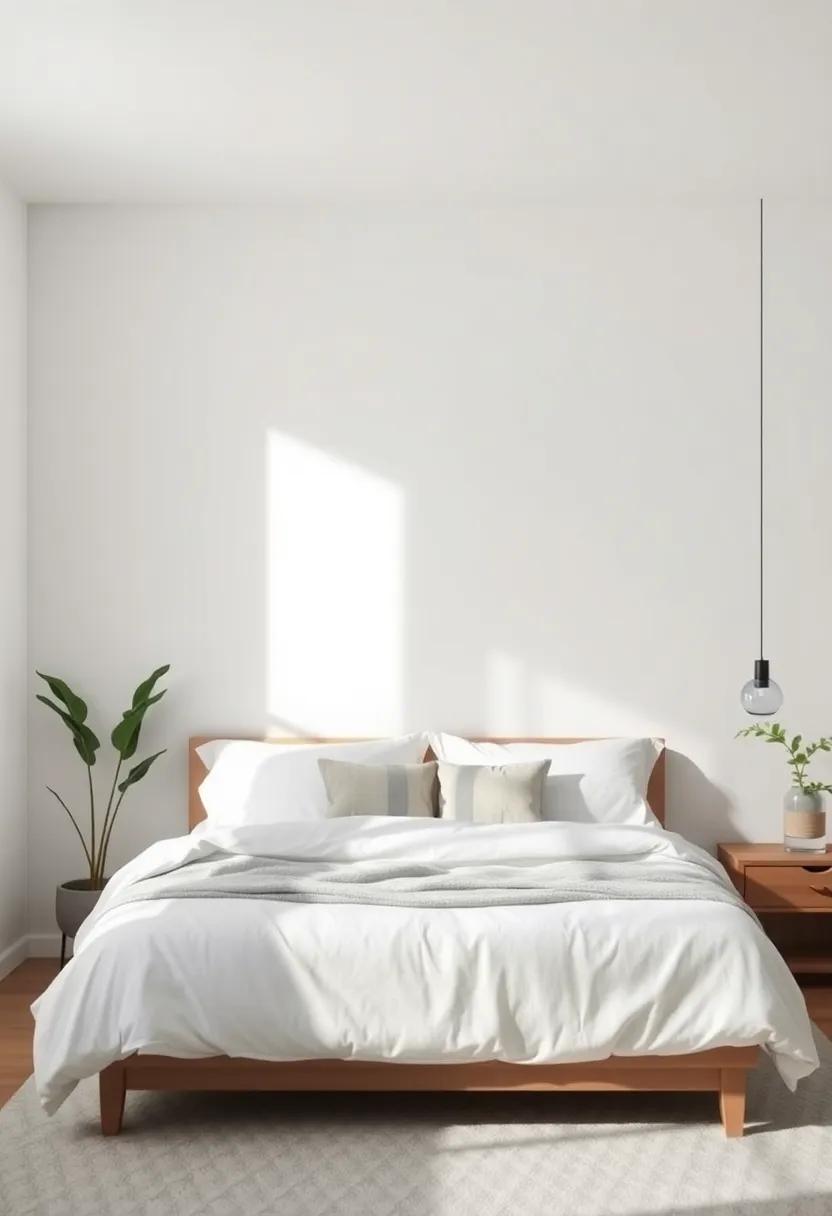
Murals can serve as stunning focal points in small bedrooms, adding depth and character without overwhelming the space.By choosing a captivating design, you can draw the eye and create a sense of continuity within the room. Consider nature-inspired themes that evoke tranquility, such as soft floral patterns or serene landscapes. Alternatively, abstract artwork can infuse energy and modern style, making the bedroom feel vibrant yet cozy. the key is to select a mural that resonates with your personal style while ensuring it complements the existing decor.
When planning your mural, think about placement and scale to maximize visual impact. Here are some key factors to consider:
- Accent Walls: Designate one wall as a canvas to ensure the mural enhances, rather than competes with, other elements in the room.
- Color Palette: Choose colors that harmonize with your bedding and furnishings to maintain a cohesive atmosphere.
- Personal Touch: Incorporate meaningful motifs or quotes that reflect your personality,turning the mural into a personal narrative.
| Mural Style | Effect on Space |
|---|---|
| Pastel Patterns | Creates a soothing, airy feel. |
| Bold Graphics | Injects energy and personality. |
| Nature Scenes | Invites tranquility and a touch of the outdoors. |
Dual-Tone Techniques Enhancing Depth in Limited Areas
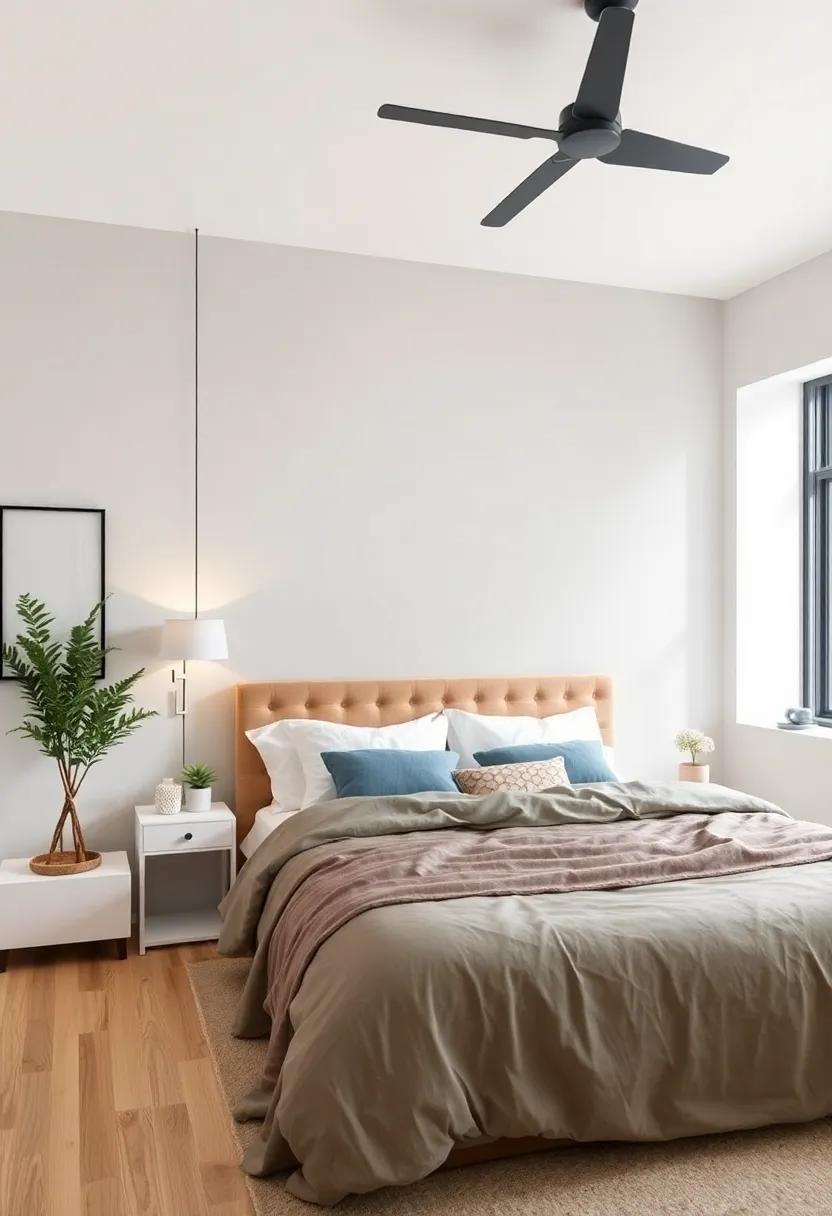
exploring the use of dual-tone techniques can be a game-changer in small bedrooms, adding depth where it’s needed most.By selecting two complementary colors, you can create a striking visual effect that draws the eye and makes the space feel larger and more dynamic. Consider the following combinations for a stylish conversion:
- Soft Gray & White: A soothing palette that opens up the room while staying elegant.
- Pastel Blue & Cream: This combination gives a breezy, airy feeling perfect for relaxation.
- Charcoal & Light Pink: A bold contrast that infuses modernity and sophistication.
Implementing these colors through strategic applications can further enhance your small space. For instance, try painting the upper half of the walls in a lighter shade while opting for the darker hue on the lower half. This technique not only creates an illusion of height but also adds visual interest. Additionally, consider using dual-tone colors for furniture—think of a nightstand painted in two colors, or adding a striped pattern to a headboard:
| Technique | Description |
|---|---|
| Accent Wall | A bold color paired with a subtle neutral can create a stunning focal point. |
| Color Blocking | Using large blocks of different colors to enhance architectural features. |
| Two-Tone Trim | Two different colors for baseboards and crown molding add a sophisticated flair. |
Creative Use of Color Blocking in Small Room Design
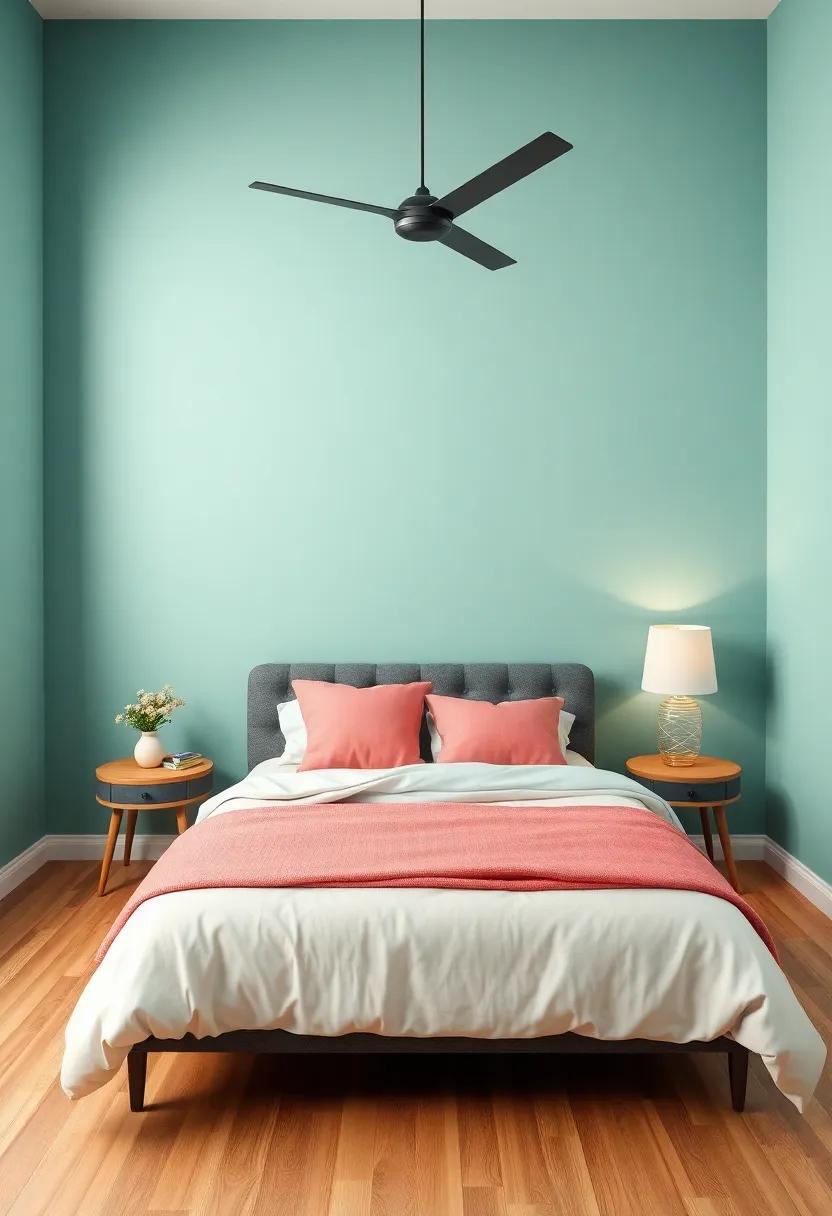
Color blocking is a bold and modern technique that can dramatically alter the perception of space in a small bedroom. By using contrasting colors on different walls or sections of the room, you can create visual interest and depth. Consider the following creative approaches:
- Accent Wall: choose a vibrant hue for one wall while painting the others a softer shade to highlight the focal point.
- Diagonal Design: Paint sections diagonally for an unconventional look that adds dynamic character and draws the eye upward.
- Geometric Shapes: Use painter’s tape to create geometric patterns that offer a playful yet sophisticated vibe.
To effectively apply color blocking, the choice of color combinations is key. Utilize a palette of complementary or analogous colors to maintain harmony while making a statement. here’s a simple guide to selecting colors:
| Color Pairing | Effect |
|---|---|
| Teal and Gray | invigorating yet balanced, perfect for a serene atmosphere. |
| Coral and Mint | Bright and refreshing, ideal for a cheerful and lively space. |
| Mustard and Navy | Warm and sophisticated, excellent for adding a touch of elegance. |
Mixing textures and Finishes for Visual Interest
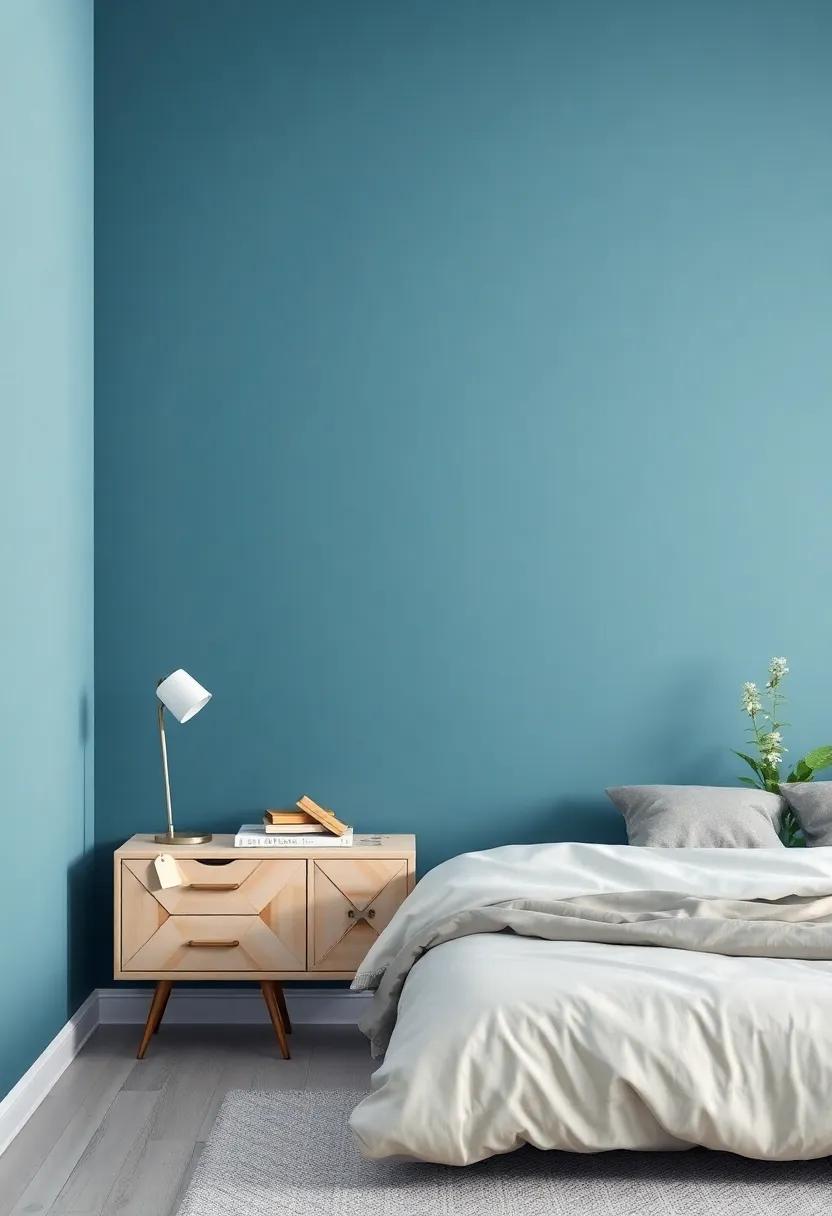
In a small bedroom, incorporating a variety of textures and finishes can create an inviting atmosphere and maximize your space’s visual impact. consider using matte and glossy surfaces together to enhance depth. As an example, pairing a matte wall paint with shiny metallic accents or glossy furniture can add a dynamic element to the room. You might also want to explore different material combinations, such as using soft textiles for bedding or curtains, alongside hard surfaces like wood or metal. This mixture not only differentiates areas within the space but also creates a more layered and interesting design narrative.
Another effective approach is to experiment with accent walls that feature unique textures or finishes. A rich,textured wallpaper on one wall can complement simple,solid-colored paint on the others,drawing the eye and making the space feel larger. In addition to wallpaper, think about using decorative paneling, such as shiplap or beadboard, which can add warmth and personality. To further enhance the visual appeal, consider incorporating a small table or shelf made from natural materials like reclaimed wood, contrasted with metal or glass accessories. This thoughtful layering of textures will invite exploration and make even the smallest bedroom feel both stylish and purposeful.
Highlighting Architectural Features with Color
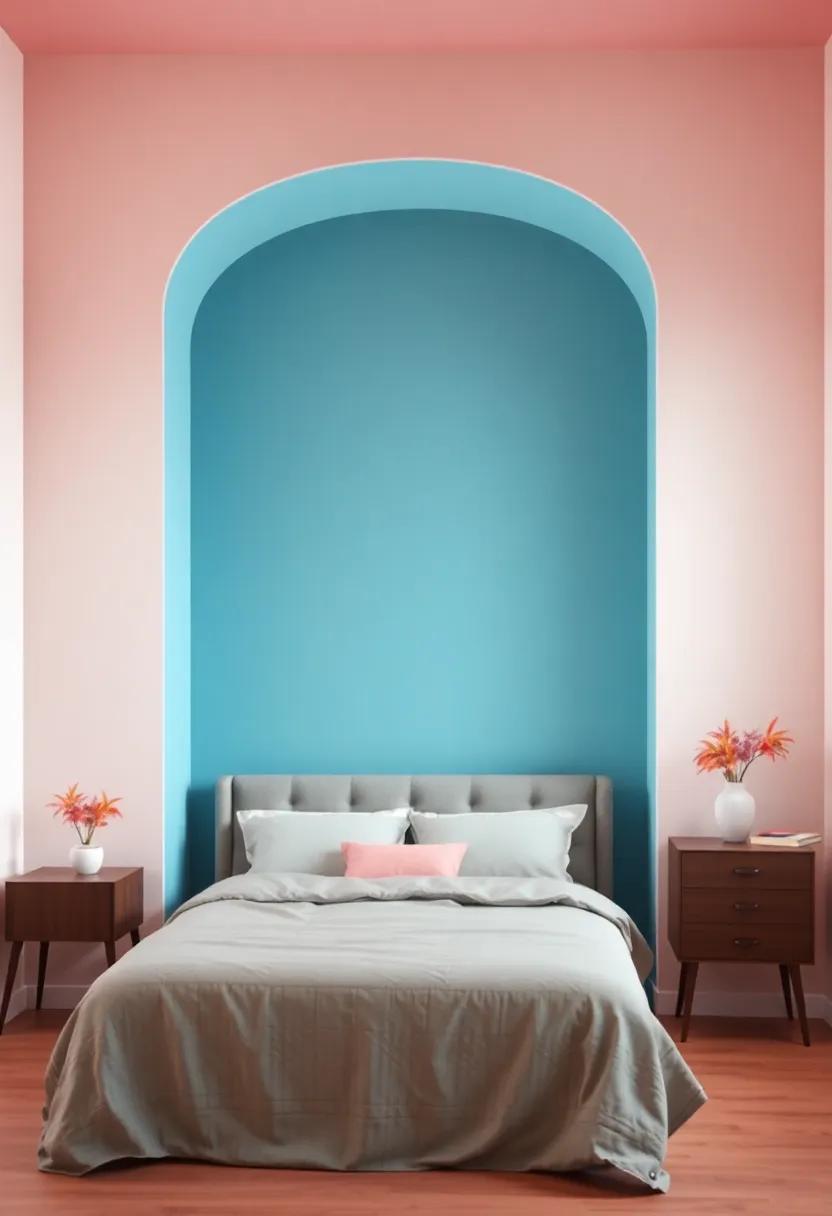
To draw attention to the unique elements of a small bedroom, using color strategically can work wonders.For instance, envision painting the molding and baseboards a deeper shade than the walls to create depth and texture, providing a striking contrast that brings out architectural details. Highlighting features like built-in shelves or alcoves with a soft, complementary color can also make them pop without overwhelming the space.Consider these tips for maximum impact:
- Accent Walls: Use a bold hue on one wall to create a focal point.
- Two-tone Painting: Divide walls horizontally to elongate walls visually.
- Color Blocking: Section off areas with blocks of color to define spaces without dividing them physically.
When planning your color scheme, it’s essential to keep the overall aesthetic balanced. Lighter colors tend to make a room feel larger, while darker shades can add warmth and coziness. A carefully crafted palette that harmonizes different tones can enhance the architectural flow of your bedroom. For inspiration, consider the following color combinations:
| Color Combination | Effect |
|---|---|
| Pale Blue & Soft White | Creates a serene, airy feel. |
| Charcoal & Mustard Yellow | Brings warmth and sophistication. |
| Mint Green & Beige | Offers a refreshing, natural vibe. |
Applying Color Gradients for a Soft transition
Color gradients are an enchanting way to enhance the visual appeal of your small bedroom while concurrently creating an illusion of space.By blending two or more colors together, you can achieve a soft transition that draws the eye upward and around the room. Consider utilizing a gradient that features cool colors like blues and greens, which can create a calming atmosphere that makes the room feel more expansive. You might start with a deep navy at the base and gradually shift to a light sky blue at the top, giving the effect of a taller ceiling. This technique can be particularly striking when paired with neutral furniture that allows the gradient to take center stage.
When applying a gradient, it’s essential to think about the direction and intensity of the colors. Using a vertical gradient can impart a sense of height,while a horizontal gradient can make the room feel wider. For a bolder statement, try incorporating a color that complements your primary gradient for accessories or bed linens.Here are some tips for successful application:
- Choose colors from the same family for a more cohesive look.
- Experiment with sheens; a satin finish can catch light beautifully.
- Use painter’s tape to create clean lines between the colors.
Perfecting Floating Shelves with Complementary Hues
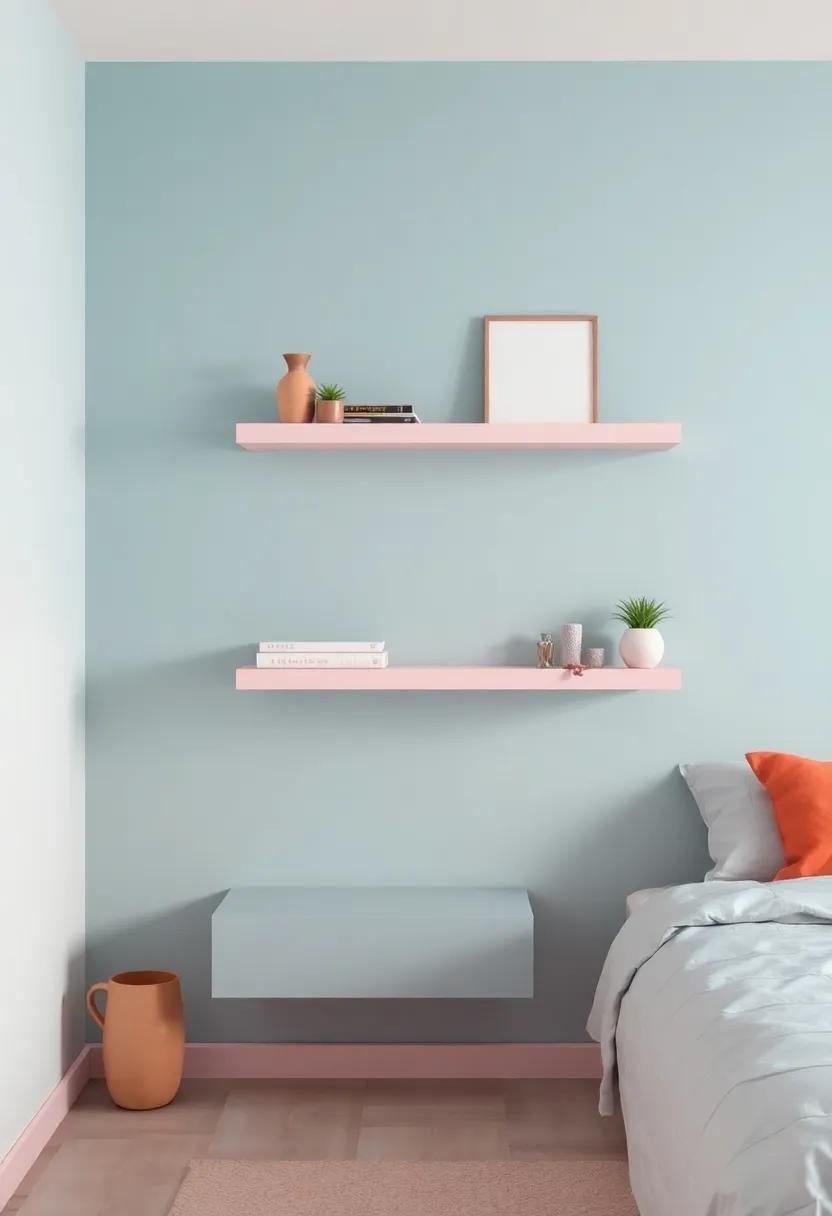
Floating shelves are an excellent way to elevate your small bedroom’s functionality while adding a splash of style. To make these shelves pop, consider painting them in complementary hues that harmonize with your wall color.For instance, if your walls are a soft pastel blue, sleek navy or vibrant coral shelving can create visual interest without overwhelming the space. By choosing colors that complement each other, you enhance the overall aesthetic, making this practical storage solution a true focal point.To maximize the effect, ensure the items displayed on the shelves are also in a thoughtful color palette, creating a cohesive and inviting look.
In addition to color choices, the placement of floating shelves can dramatically impact your bedroom’s ambiance. Aim for strategic locations where they can catch the eye and serve dual purposes. Consider positioning them above the bed or desk,allowing for both decorative displays and essential storage. Utilizing mixed textures in your decorations, such as wooden frames, glass vases, or metallic accents, can further enrich the visual experience. Here are some ideas for color combinations that can boost your floating shelves:
| Wall Color | Shelf Color | Accent Color |
|---|---|---|
| Soft Gray | Charcoal | Mustard Yellow |
| Mint Green | Rich Teal | Coral Pink |
| Pale Lavender | Deep Plum | Soft Gold |
| warm Beige | Forest Green | Terracotta |
Harmonizing Paint with Bedroom Accessories
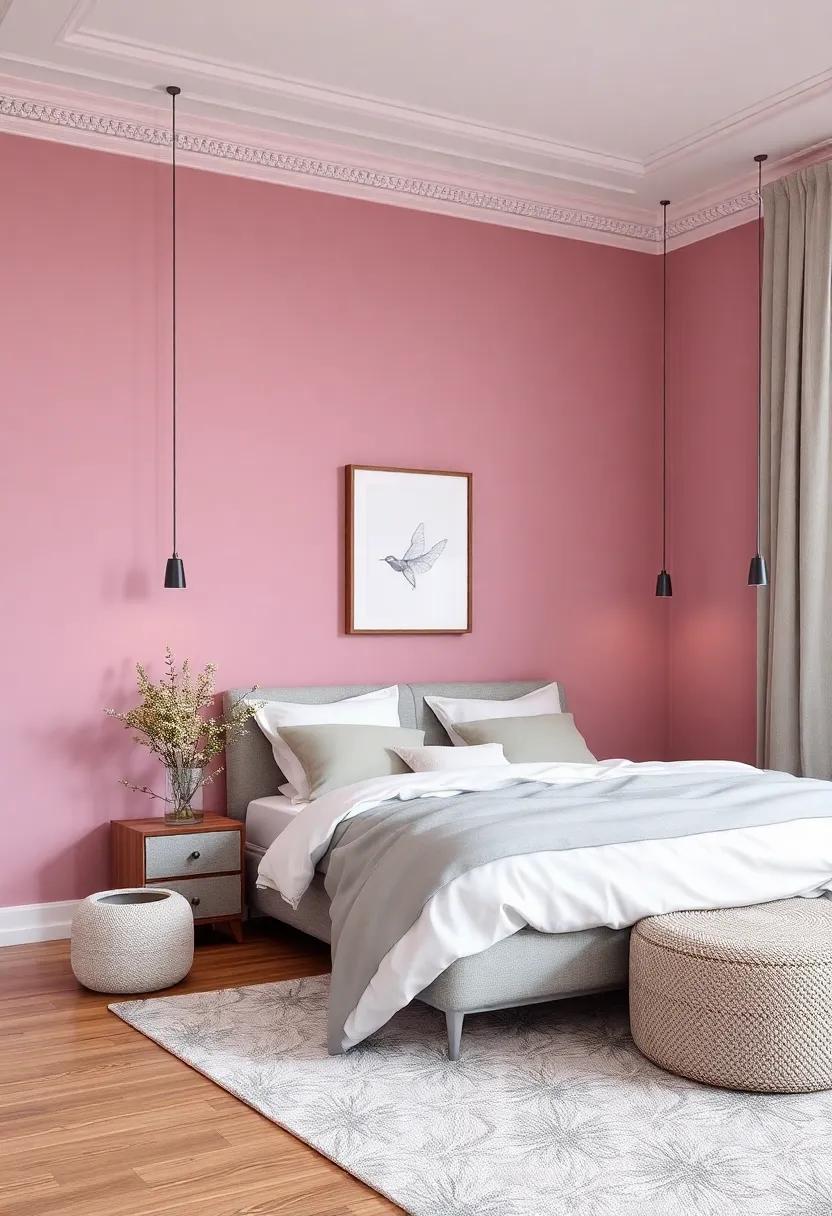
Choosing the right paint color for your small bedroom is only the first step in creating a cohesive look; harmonizing it with bedroom accessories is where the magic truly happens. Think of accent pillows, throws, and artwork as essential components that can elevate your space. A soft pastel blue on the walls can pair beautifully with white trim and a collection of vibrant, patterned pillows on your bed to create a lively yet serene atmosphere. Likewise, incorporating a statement piece, such as a striking piece of wall art that reflects the wall color, can bridge the gap between your palette and your décor.
When coordinating accessories, consider an integrated color scheme or complementary hues that enhance your selected paint. Here are some tips:
- Use metallic accents, like gold or silver, to add a touch of glamour that contrasts well with darker wall shades.
- Choose natural materials—like wood or wicker—that bring warmth and texture, balancing out cooler paint tones.
- Incorporate layered textiles, such as a plush rug underfoot and velvet curtains, to soften the overall look while adding depth.
| Paint Color | Accessory Style |
|---|---|
| Soft Pastel Blue | Floral Patterns |
| Warm Taupe | Natural textures |
| Bright White | Bold Pops of Color |
By selecting bedroom accessories that resonate with your chosen paint, you’ll create a harmonious vibe that not only enhances the design but also ensures your space feels larger and more inviting. Remember, the key is to maintain a balance between visual interest and cohesiveness, allowing your personality to shine through in every detail of the room.
Transformative Color Trends for a Fresh Update
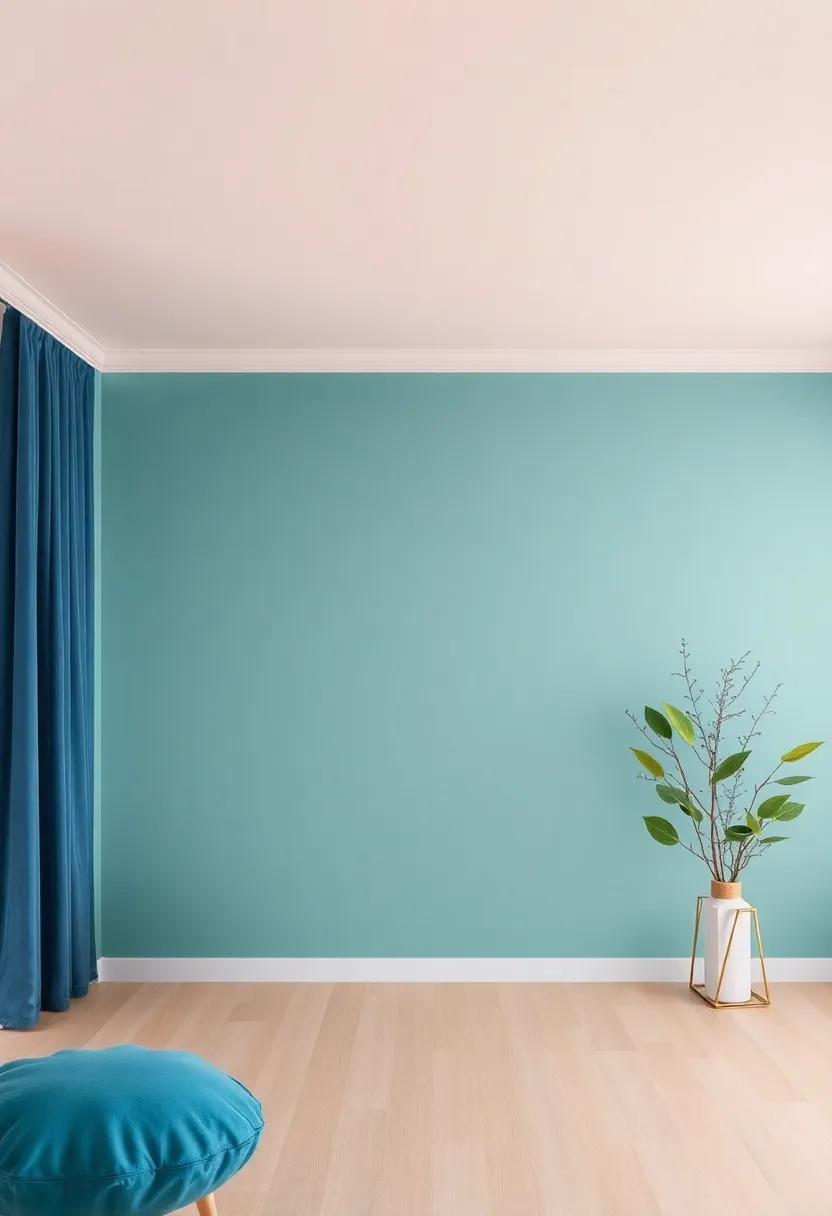
Revitalizing your small bedroom doesn’t have to be a daunting task; utilizing the power of color can create an illusion of space while infusing a fresh sense of style. Light, cool hues like soft blues, pale greens, and gentle grays can visually expand your space, making walls recede and allowing natural light to reflect beautifully throughout the room. Pair these with crisp white trims to enhance brightness, or introduce bold accent colors in accessories to add depth without overwhelming the senses. Consider creating a single accent wall in a vibrant shade, such as coral or teal, to anchor the space and add personality without sacrificing the airy feel often desired in smaller rooms.
Additionally,experimenting with textures can enhance your color choices and provide a more dynamic atmosphere.Incorporate textured wallpapers or even washable paints with a slight sheen to reflect light and give the illusion of depth. For an innovative twist, try a two-tone effect where the lower half of the walls is painted in a darker shade and the upper half remains light. This technique draws the eye upwards, creating the perception of higher ceilings. Check out the table below for coordinating color palettes that maintain harmony while maximizing style:
| Base Color | Accent Color | Trim Color |
|---|---|---|
| Soft Blue | Coral | White |
| Pale Green | Mustard Yellow | Cream |
| Light Gray | Charcoal | Glossy Black |
Personalized Wall Art to Enhance Color Schemes
Elevate your small bedroom’s aesthetics by incorporating personalized wall art that resonates with your color schemes. Custom pieces not only serve as eye-catching focal points but also reflect your unique personality and style.Consider canvas prints, framed photos, or hand-painted murals that harmonize with the existing palette. This can range from soft pastels to bold, vibrant hues, ensuring that your artwork complements rather than clashing with your overall design. Here are some ideas to inspire you:
- Monochrome Masterpieces: Use black and white photography to create a sleek, modern feel.
- Color Gradients: Choose art that transitions through a spectrum of colors, adding depth to your walls.
- Textured Elements: Incorporate mixed media art that plays with light and shadow, bringing a 3D effect to your space.
When selecting personalized wall decor, consider how it interacts with your furniture and fixtures. Color can transform the perception of space, making it feel larger or cozier. Use wall art strategically; for instance, oversized pieces can enhance a focal wall, while smaller artworks can create a gallery-style effect, drawing the eye around the room. Here’s a simple guide to coordinating your wall art with furniture colors:
| Furniture Color | Art Color Proposal |
|---|---|
| Neutral Tones | Bold, Bright Colors |
| Pastel Shades | Complementary Pastels |
| Dark Colors | Light, Vibrant Artwork |
Seasonal Color Changes to Keep your Bedroom Fresh
Transforming your bedroom for the different seasons can be an exhilarating way to keep the space feeling fresh and inviting. In spring, consider incorporating soft pastels like mint green or blush pink to evoke a sense of renewal. As summer rolls around, light and airy shades such as sky blue or sunny yellow can brighten up your room, making it feel more expansive. fall invites rich, warm hues like burnt orange and deep burgundy, which can create a cozy ambience, while winter calls for cool tones such as ice blue and warm gray to reflect a serene, snug atmosphere. Here are some color ideas for each season:
- Spring: Mint Green, Blush Pink
- Summer: Sky Blue, Sunny Yellow
- fall: Burnt Orange, deep Burgundy
- Winter: Ice Blue, Warm Gray
To add an extra flair, you can opt for two-tone walls, where you paint the lower half in a bolder hue and the upper half a lighter shade to create the illusion of height. Accent walls in textured wallpaper or a striking mural can also give your small bedroom a unique character, drawing the eye and cleverly diverting attention from its size. Don’t forget the power of accessories; changing out your bedding and throw pillows to match seasonal colors can instantly refresh your space without the need for a full paint job. Below is a quick comparison of texturing options:
| Texture Option | Description |
|---|---|
| Matte Finish | Soft,non-reflective surface; great for creating depth. |
| Satin Finish | Subtle sheen that brightens without overpowering, adds elegance. |
| Textured Wallpaper | Adds tactile interest; can enhance color and style. |
Creating a Thematic Color Story for Your Bedroom
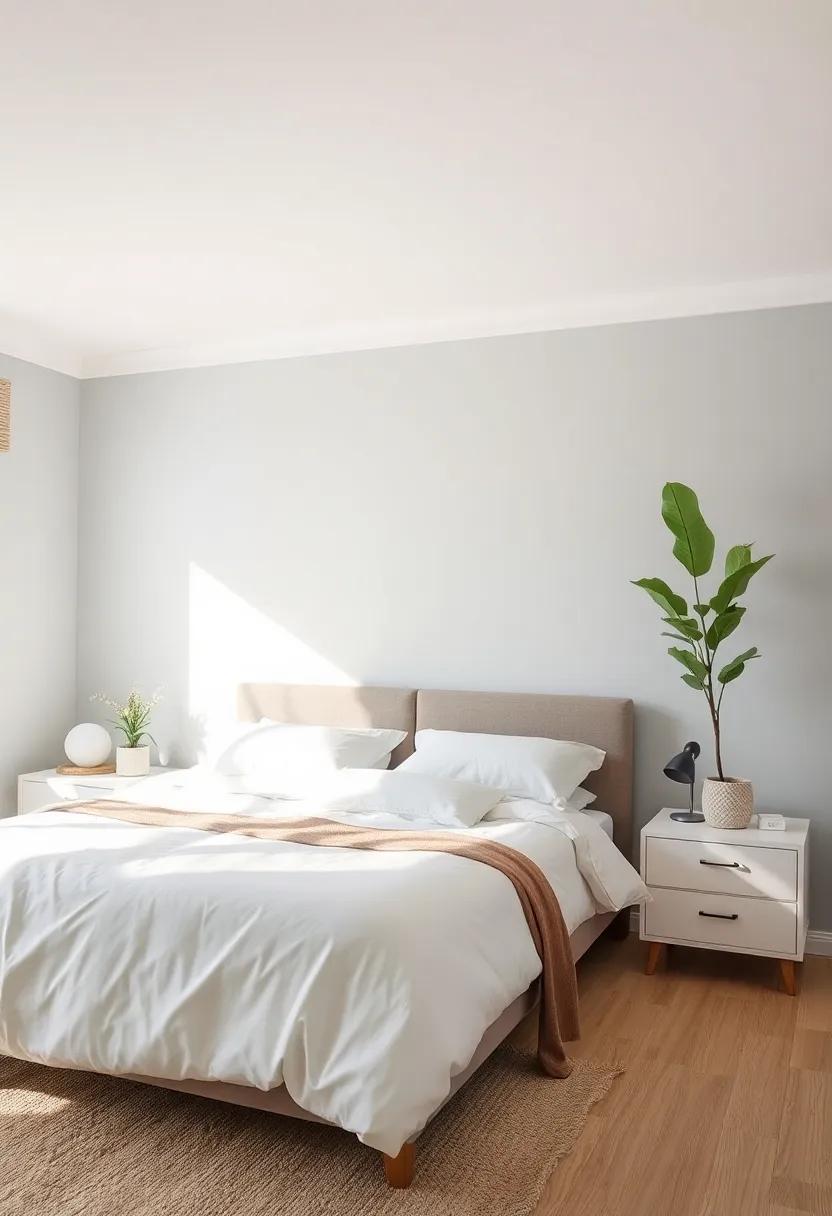
Integrating a thematic color story into your bedroom can significantly enhance its overall atmosphere and make it feel more spacious. start by selecting a base color that resonates with you—consider soft hues like pastel blues or light grays that can create an airy feel. From there, build upon your base with complementary shades and accent colors. For instance, pairing your base with charcoal or mint accents can add depth without overwhelming the senses. Use a color wheel to identify shades that harmonize well and evoke the desired mood, whether it’s calm and serene or vibrant and energetic.
To create visual interest,think about using different finishes and textures alongside your color choices. A combination of matte walls with glossy furniture allows light to reflect and bounce around the room, further enhancing the spacious vibe. Don’t forget to incorporate artwork and textiles that reflect your chosen palette. Here are some key elements to consider:
- Accent pillows: Choose pillows that incorporate your accent colors for easy updates.
- Wall art: Select pieces that blend or contrast beautifully with your base color.
- rugs: A colorful rug can tie your whole color story together and add warmth.
Charming Small space Inspirations from Around the World
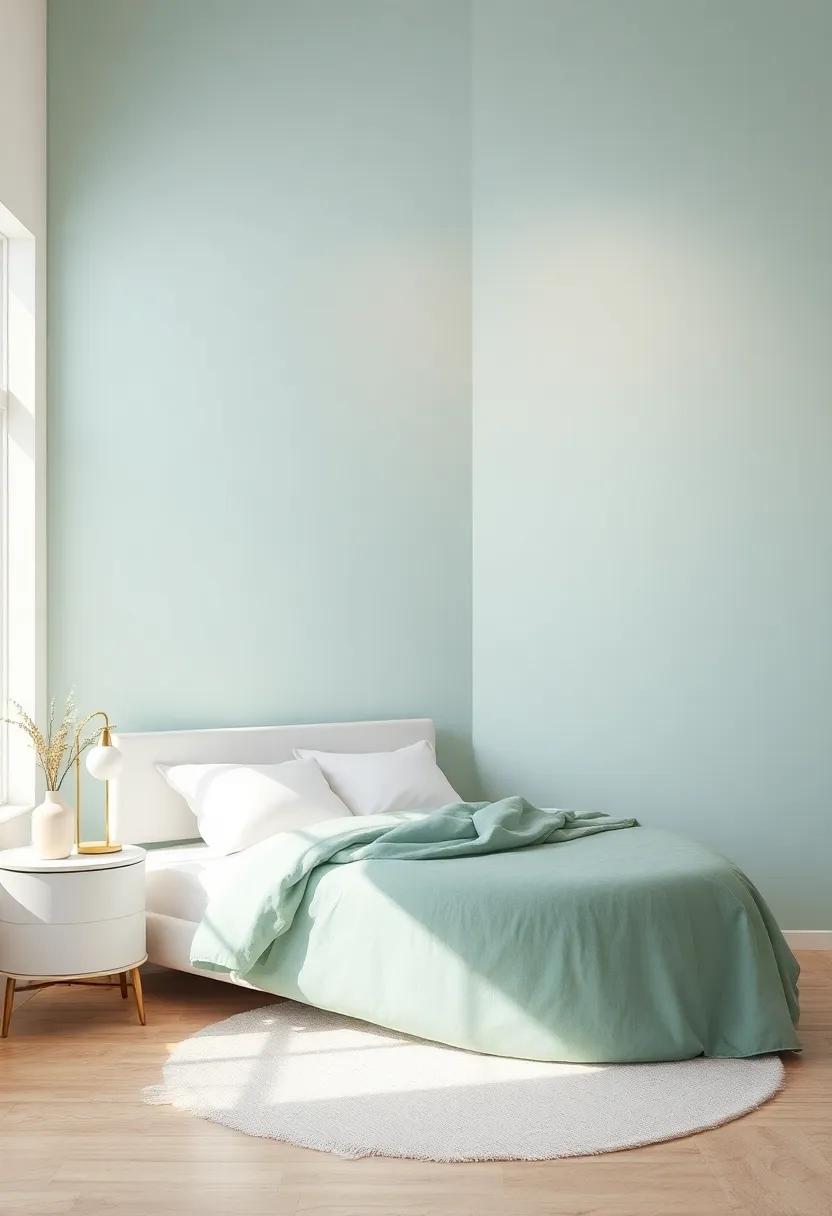
Small bedrooms can be transformed into serene sanctuaries with the power of color. For a light and airy feel, consider using soft pastels such as mint green or pale lavender on the walls. This approach not only adds a subtle charm but also reflects light,making the room appear larger. Accent pieces,such as cushions and bedding in complimentary shades,can tie the room together,creating a cozy yet stylish atmosphere. You might also opt for a bold feature wall in deep navy or forest green to bring depth and drama to the space without overwhelming it.
Using paint creatively can elevate functional elements of your bedroom. Incorporate horizontal stripes to elongate the walls visually, or paint your furniture in hues that blend seamlessly with your walls, promoting a cohesive look. If the room has sloped ceilings or odd angles, consider painting them in the same color as the walls to diminish their visual weight. For an unexpected twist, try a mural that reflects your personality, ensuring that every inch of space feels uniquely yours. Here’s a quick color idea table for your small bedroom makeover:
| Color | Effect |
|---|---|
| Soft Pastel Shades | Creates an airy, spacious feeling |
| Bold Feature Wall | Adds depth and drama |
| horizontal Stripes | Visually elongates the room |
| Painted furniture | Promotes a cohesive look |
Tips for Choosing the Right Paint Finish for Small Rooms
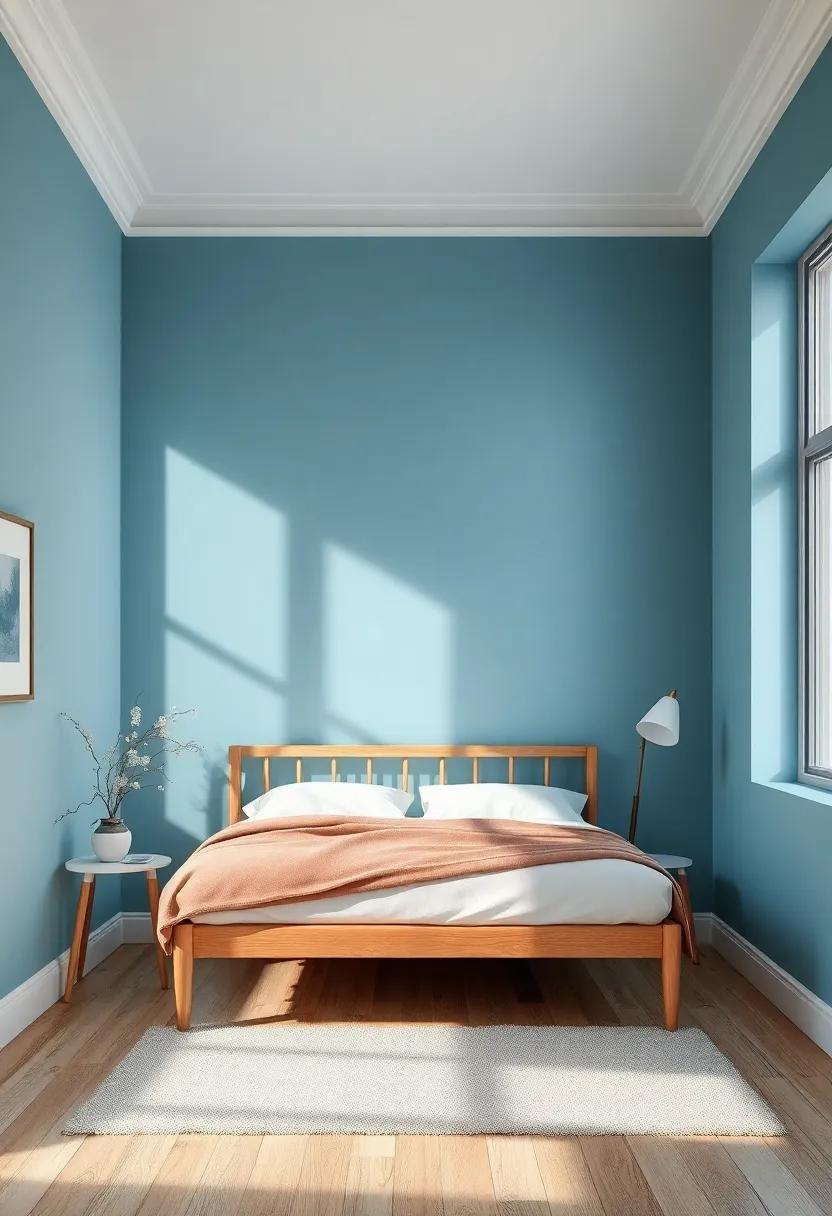
Choosing the right paint finish for small rooms can truly enhance their appeal and functionality. Matte finishes are ideal for creating a soft, understated look that helps to hide imperfections in walls, making them perfect for cozy bedrooms.They provide a warm, inviting atmosphere but can be prone to scuffing. In contrast, egg-shell or satin finishes offer a bit more durability while still maintaining a gentle sheen. These options reflect light subtly, which can help visually expand a space without overwhelming it. Consider the following when making your decision:
- Light Reflection: Higher gloss finishes reflect more light, enhancing brightness.
- Durability: Consider how much wear and tear your walls will endure.
- Style and Ambiance: Match your finish to your desired room vibe.
For areas with high moisture or frequent cleaning, such as a small bathroom connected to your bedroom, semi-gloss finishes are recommended. They repel moisture and are easier to wipe clean, ensuring longevity in chic design. Another smart tip is to test samples on posters or large swatches on the walls. This method allows you to assess how different finishes and colors interact with your lighting throughout the day. Keep a quick reference table in mind when choosing your finish:
| Finish Type | Best For | Durability |
|---|---|---|
| Matte | Low-traffic areas | Low |
| Eggshell | Living rooms & bedrooms | Medium |
| Satin | high-traffic spaces | Medium to High |
| Semi-gloss | Bathrooms & kitchens | High |
Refresh Your Bedroom with Multicolor Techniques
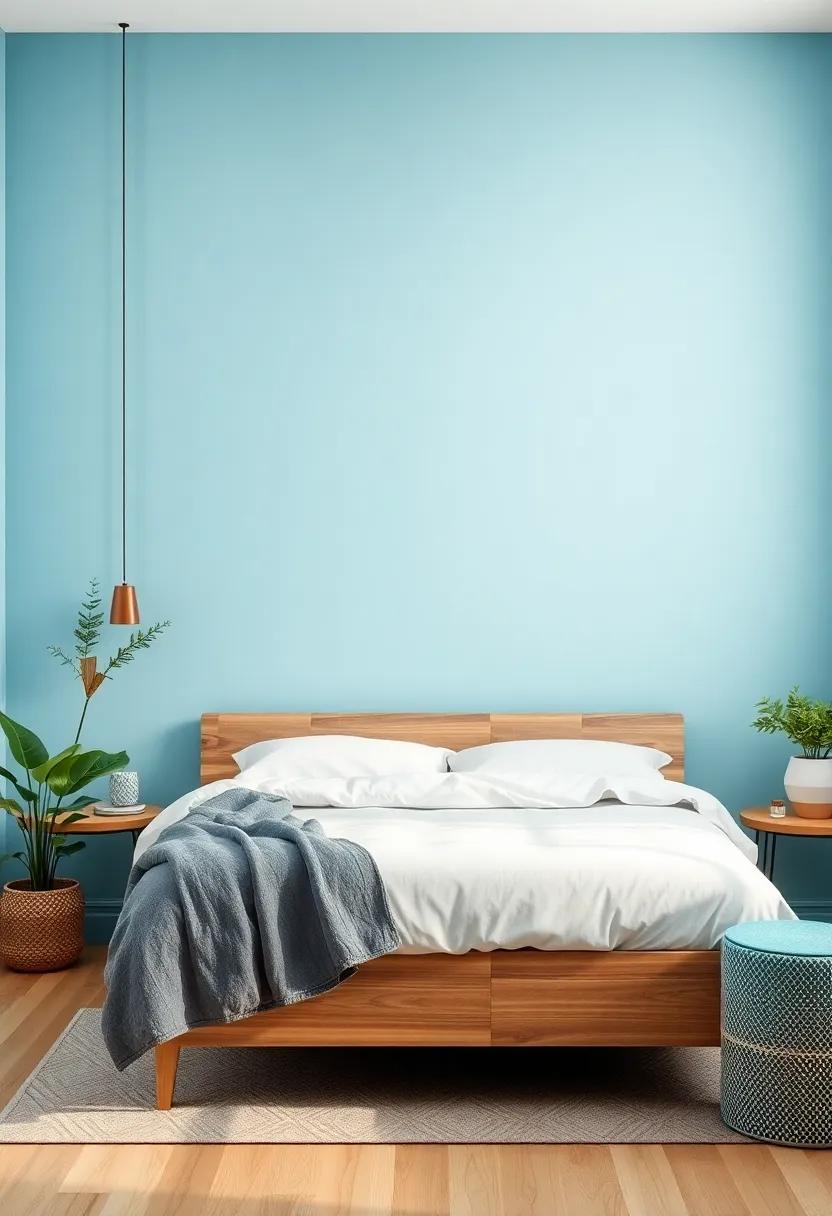
Revamping your bedroom with multicolor techniques can dramatically enhance its character and create an illusion of expanded space. Accent walls are a perfect way to introduce vibrant tones without overwhelming the room. Choose a bold color for one wall while keeping the others neutral to maintain balance. Additionally, employing color blocking—where different sections of the wall feature various colors—can add depth and interest. Consider colors that complement your existing décor,such as pairing soft pinks with rich blues or earthy tones against crisp whites.
Another engaging approach is to implement ombre effects or gradient painting. This technique gradually blends colors from light to dark, drawing the eye upward and making ceilings appear higher. Use lighter shades near the ceiling and transition to deeper hues at the base for a modern twist. To further enhance your design, incorporate accessories that match the selected colors, such as cushions, curtains, or artwork. Here’s a quick overview of some engaging color techniques:
| Technique | Description |
|---|---|
| Accent Walls | One bold color to create a striking focal point. |
| Color blocking | different sections of the wall with various complementary shades. |
| Ombre Effects | Gradual color transition that visually elevates the space. |
Utilizing Windows as a Canvas for Unique Effects
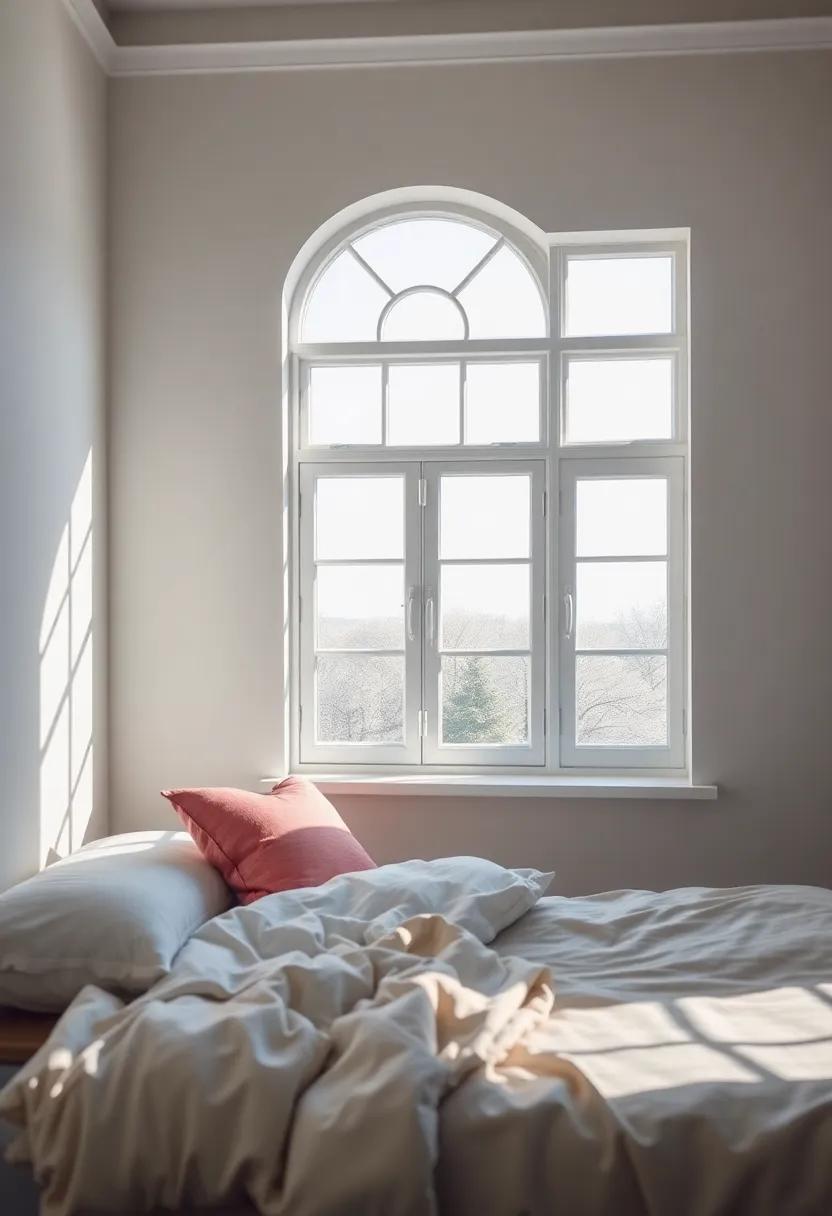
Transforming your windows into a captivating focal point can amplify both the style and illusion of space within your small bedroom. consider incorporating translucent window films that add a touch of privacy while filtering natural light. These films come in various patterns, from whimsical florals to geometric designs, allowing you to personalize your sanctuary without sacrificing brightness.In addition, a layered curtain setup can create depth; opt for sheer curtains as a base and pair them with heavier drapes in complementary colors. This not only adds a rich textural element but also offers versatility in light control.
Additionally, consider implementing a stenciled design directly on your window panes for a playful twist. Use washable window paint to craft simple motifs like stars or stripes, creating a unique effect that can change with the seasons. Below are some suggested styles for window treatments and effects that can be utilized:
| Style | Effect |
|---|---|
| Translucent Window Films | Adds privacy and filters light |
| Layered Curtain Setup | Enhances depth and texture |
| Stenciled Designs | Personalized decorative elements |
| Colored Sheens | Creates ambient light effects |
Final Thoughts
As we close this journey through the vibrant world of color and creativity, remember that a small bedroom is not just a limitation but a canvas waiting for your imagination to take flight.With the transformative power of paint at your fingertips, you have the ability to shape not only the style of your sanctuary but also the way you experience its space.Whether you opt for bold hues to create a cozy cocoon or soft pastels to open up the room, every stroke of your brush can enhance both functionality and flair. So, gather your tools, unleash your creativity, and embrace the art of transformation. Your small bedroom is ready to become a stunning reflection of your personal style, proving that sometiems, it’s the little spaces that make the biggest impact. Happy painting!
 decorifusta Garden and patio decoration inspiration
decorifusta Garden and patio decoration inspiration 